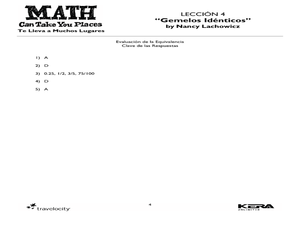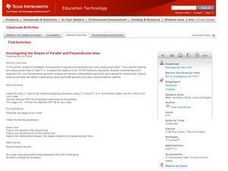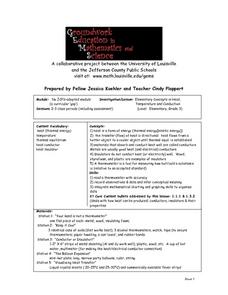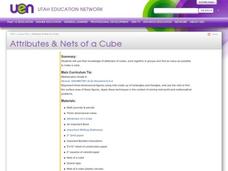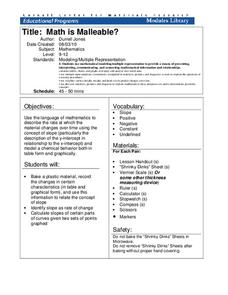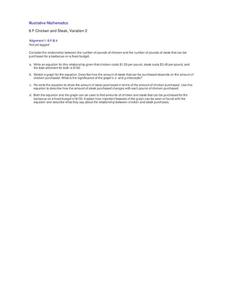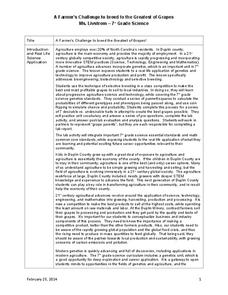Curated OER
Identical Twins
Sixth graders work with equivalent fractions, decimals, and percents. In this equivalency activity, 6th graders participate in a number of activities aimed at increasing their understanding of equivalent expressions. They form a human...
Curated OER
Investigating the Slopes of Parallel and Perpendicular Lines
High schoolers investigate parallel and perpendicular lines. They use Cabri Jr. to construct and explore the relationships between the slopes of parallel and perpendicular lines. The drawing and measurement tools available with Cabri Jr....
Curated OER
Leaping!
Students properly leap and measure their distance. In this leaping lesson, students practice leaping for accuracy and proper form. Students estimate their leaps and measure with rulers. Students determine distance covered by the entire...
Curated OER
Elementary Concepts in Heat
Third graders read a thermometer with accuracy, record observations and data, and infer conceptual meaning. They integrate mathematical charting and graphing skills to organize their data. They explore what happens when they touch or use...
Curated OER
Attributes & Nets of a Cube
Third graders engage in a lesson that focuses on the attributes and forming of a cube. They construct a cube using different combinations while comparing a square with only two-dimensions. Students fold paper while following the...
Curated OER
Landforms
Students study how landforms affect all aspects of a community. Students work in groups to identify landforms from other works of art. In cooperative groups Students select a work of art depicting a particular land form and create a poem.
Curated OER
Favorite Foods
Students draw a picture. In this favorite foods lesson, students list the foods they like to eat and form each like into a complete sentence. Students cut the word in the sentences apart and then arrange them in the correct order with a...
Curated OER
The Sun-Earth Connection
Third graders research about the location of different planets from the sun. In this earth science lesson, 3rd graders discuss the weather in their place and identify common weather terminologies. They explain how tornadoes form and...
Curated OER
Positive and Negative Angles and Arcs
To better understand that the intersection point of two lines lies inside a circle, learners use their keen measurement skills. They discuss arcs, rays, tangent lines, and reflex angles. Then, they put their skills to work as they...
Curated OER
Does the Area of the Quadrilateral Change?
Students study area and quadrilaterals. In this multiplication and area lesson, students use Polystrip models to change rectangles to form different parallelograms. Students find the area of the models use a Geometer Sketchpad to find...
Curated OER
Heart Smart in a Heart Beat
As an introductory activity, young statisticians measure their heart rate at rest and after exercise and compute the mean and median, and create a box & whisker plot. This is followed by watching a video (that no longer seems...
Curated OER
Problem Solving Techniques
Young scholars develop a pattern for problem solving. They gain confidence in their ability to solve problems and are introduced to mathematics help online.
Curated OER
Community Wellness Fair
Twelfth graders list ideas to create a wellness fair. They form student committees to organize times for each class to participate in the fair. Students assist in setting up the fair by putting up tables for the exhibitors, preparing...
Alabama Learning Exchange
Mix it Up! Exploring the Commutative and Associative Properties of Addition
Examine commutative and associative properties with your class. They'll explore the relationships between addition and subtraction and investigate patterns as they solve addition problems. Links to an assessment and a table game are...
Cornell University
Math Is Malleable?
Learn about polymers while playing with shrinky dinks. Young scholars create a shrinky dink design, bake it, and then record the area, volume, and thickness over time. They model the data using a graph and highlight the key features of...
Teach Engineering
Organic Solar Energy and Berries
You can eat a solar cell? A unit on solar energy begins with a discussion about organic solar cells, followed by directions on how to build your own. After following the teacher's directions to build an anthocyanin...
Teach Engineering
Pushing it Off a Cliff
Focus on the conservation of energy, specifically looking at gravitational potential energy and kinetic energy, with a lecture that involves having friends throw light objects at each other to determine which has more kinetic energy and...
National Wildlife Federation
Branching Out – Exploring Dendrochronology
Tree rings from North America give a continuous history of El Nino intensity over the last 1,100 years. Scholars learn how scientists use tree rings to create timelines demonstrating variations in weather patterns. The cumulative...
Illustrative Mathematics
Chicken and Steak, Variation 2
Many organizations put on barbecues in order to make money. In a real-world math problem, the money allotted to purchase steak and chicken at this barbecue is only one hundred dollars. It is up to your potential chefs to figure out how...
University of Georgia
Splat!
What does viscosity have to do with splatter? An activity shows that the viscosity of a substance is inversely proportional to the distance of its splatter. Learners conduct the experiment by collecting data, graphing, and analyzing...
Kenan Fellows
A Farmer’s Challenge to Breed to the Greatest of Grapes
What does your class know about GMOs? Are they savvy to selective breeding? Challenge young minds to engineer the greatest crop of all time using a hands-on genetics unit. Learners discover the good and bad details of selective breeding,...
Illustrative Mathematics
Counting Squares
Challenge young mathematicians' understanding of squares with this geometry puzzle. The task is simple, identify as many squares as possible in a 3x3 array. Allow learners to work independently or in pairs as they search for squares,...
Illustrative Mathematics
Overlapping Rectangle
Challenge young mathematicians' ability to compose and decompose shapes with this fun geometry puzzle. The goal is simple, locate all of the rectangles shown in a picture of three overlapping rectangles. Perform this activity as a whole...
Virginia Department of Education
Exponential Modeling
Investigate exponential growth and decay. A set of six activities has pupils collecting and researching data in a variety of situations involving exponential relationships. They model these situations with exponential functions and solve...
